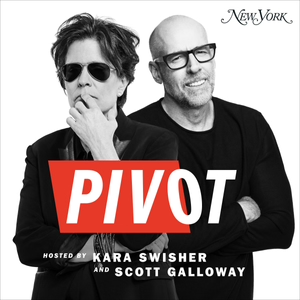
The Caixin-Sinica Business Brief, episode 83
04/15/19 • 14 min
Previous Episode

The Caixin-Sinica Business Brief, episode 82
Welcome to the 82nd installment of the Caixin-Sinica Business Brief, a weekly podcast that brings you the most important business stories of the week from China’s top source for business and financial news. Produced by Kaiser Kuo of our Sinica Podcast, it features a business news roundup, plus conversations with Caixin reporters and editors. This week: We discuss some vague progress in the seemingly never-ending U.S.-China trade war. At the Boao Forum for Asia, Premier Li Keqiang 李克强 said the trade frictions between the two countries shouldn’t even be called a war, stating, “The purpose of trade is to avoid war. If you were doing business with a knife, then it wouldn’t be business anymore.” We chat about a recent report from a U.K. watchdog, which said that further issues have been identified in Huawei’s engineering processes that pose additional risks to Britain’s telecom networks. We analyze a new report from Huawei, which released data for its performance last year. It hit a sales record of $100 billion in 2018, up 20 percent year-on-year, with net profit climbing 25 percent. We hear the news that top Chinese liquor brand Kweichow Moutai’s Shanghai-listed stocks closed at a record high of $128 last Friday as the company reported strong profit growth in its 2018 earnings report. We report that China will issue 5G wireless communications licenses by year-end as the country pushes aggressively into the cutting-edge technology that could power everything from self-driving cars to telemedicine. We learn that JPMorgan Chase and Nomura Holding won approval to set up new securities joint ventures in China with majority foreign ownership as regulators followed through on a promise to open up the country’s financial markets. We note that shares of Chinese companies linked to growing cannabis plunged last week after several firms were asked to disclose progress on industrial cannabis projects. In addition, we talk with Caixin managing editor Doug Young about the IPO of a Chinese online education company and a string of recent news in the auto industry in China. See Privacy Policy at https://art19.com/privacy and California Privacy Notice at https://art19.com/privacy#do-not-sell-my-info.
Next Episode

The Caixin-Sinica Business Brief, episode 83
Welcome to the 84th installment of the Caixin-Sinica Business Brief, a weekly podcast that brings you the most important business stories of the week from China’s top source for business and financial news. Produced by Kaiser Kuo of our Sinica Podcast, it features a business news roundup, plus conversations with Caixin reporters and editors. This week: We discuss new data that shows China’s economic growth stabilized in the first quarter of 2019, as market confidence recovered on the back of policy support and progress in Sino-U.S. trade war negotiations. We analyze a recent report that says China's stimulus measures may increase corporate debt and reverse progress made in deleveraging the economy. We hear that despite a stimulus cooling, China is still considering new subsidies to encourage household purchases of home appliances as part of a policy package designed to expand domestic consumption. We report that China’s pension system is expected to run dry well before that generation retires in 2035. We note that more details have emerged in the new civil lawsuit brought against Chinese billionaire Richard Liu by the woman who accused him of rape last year. We learn that Lei Jun 雷军, the CEO of phone and home-electronics maker Xiaomi, may have received compensation worth over 330 times of that handed to Tencent’s head last year. In addition, we talk with Jing Xuan Teng, reporter for Caixin Global, about the child modeling industry in China. We also chat with Doug Young, managing editor of Caixin Global, about the ecommerce titan Amazon, one of the world’s biggest companies, and what’s going on with it in China. See Privacy Policy at https://art19.com/privacy and California Privacy Notice at https://art19.com/privacy#do-not-sell-my-info.
If you like this episode you’ll love
Episode Comments
Generate a badge
Get a badge for your website that links back to this episode
<a href="https://goodpods.com/podcasts/the-caixin-sinica-business-brief-50379/the-caixin-sinica-business-brief-episode-83-12456163"> <img src="https://storage.googleapis.com/goodpods-images-bucket/badges/generic-badge-1.svg" alt="listen to the caixin-sinica business brief, episode 83 on goodpods" style="width: 225px" /> </a>
Copy




